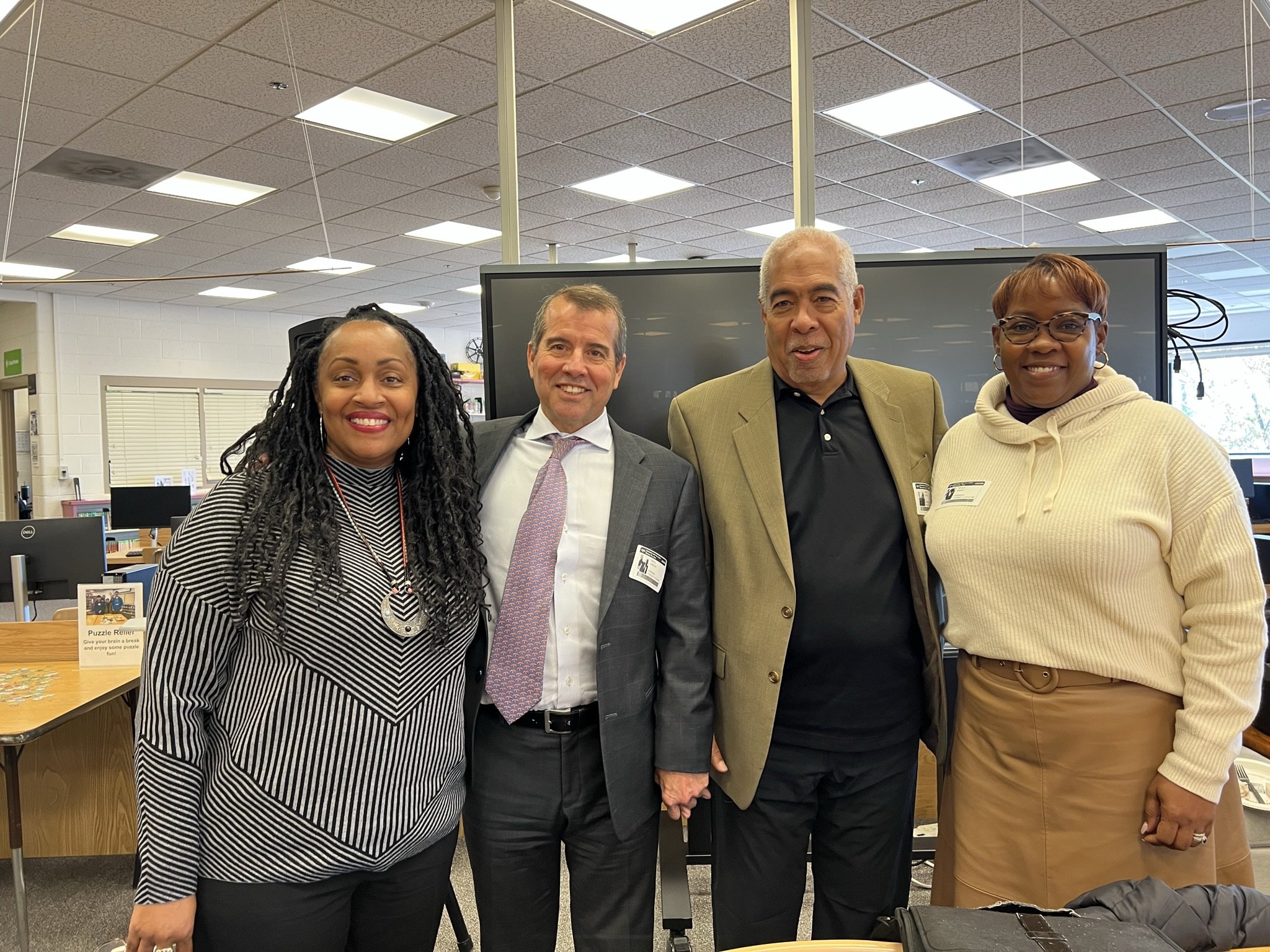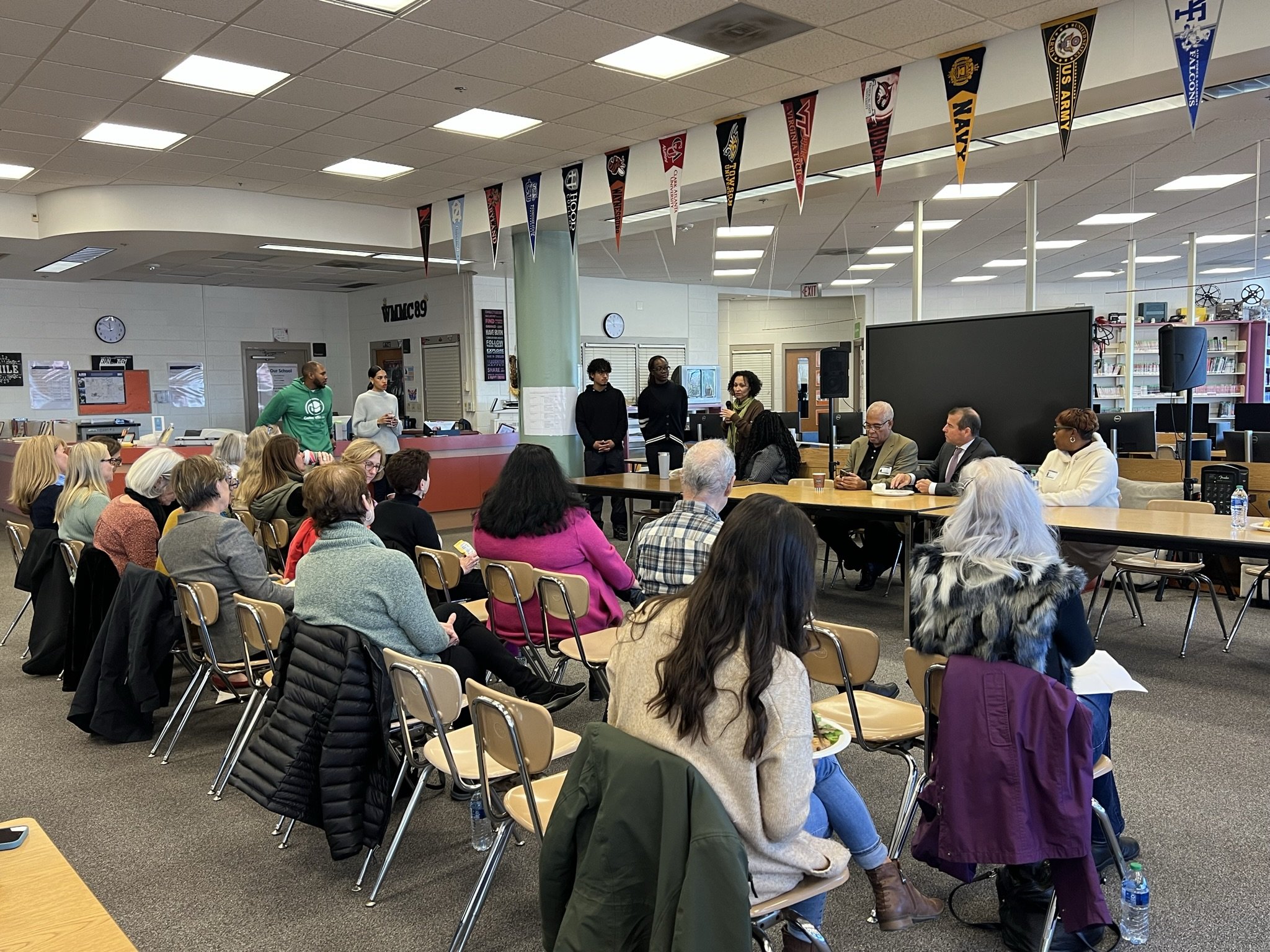Members of The Community Foundation’s Montgomery County Advisory Board, staff, and Sharing Montgomery donors recently visited with key community partners in Germantown to learn how our grantmaking is helping them to advance meaningful change.
“Over the past several years, The Community Foundation and our donors have made large and multiyear contributions to support community-driven solutions in Montgomery County,” shared Anna Hargrave, Executive Director for The Community Foundation in Montgomery County. “Today we’re excited to meet with some of our partners to hear about the impact of their work to date, what they have learned in the process, and the top priorities guiding them now.
The first stop was at Watkins Mill High School, where the group heard from students and administrators about how nonprofit partners are stepping up to address learning delays exacerbated by pandemic and the lingering mental health challenges many continue to face today.
“We have close to 1,600 students here at Watkins Mill,” shared Principal Vilma Najera. “Almost two-thirds of them come from economically disadvantaged households.”
“There’s a lot of care that our students need – and as educators, we are sometimes stuck with trying to find challenging solutions to systemic problems – that’s where our nonprofit partners and philanthropy step in to fill the gaps.”
“We need an environment where we can feel safe to dream bigger,” shared Rosaline, a Senior at Watkins Mill. She and her classmate Sam shared their experiences, as students who entered High School when schools were operating virtually during the COVID era.
“Having a community is a huge part of our success,” Sam added. “We need that foundation of people that we can trust and rely on to inspire us.”
Sam and Rosaline were followed by a panel of nonprofit leaders from The Black and Brown Coalition for Educational Equity and Excellence and CollegeTracks – two nonprofit organizations that have become an integral advocates for improved access to education and opportunity for students across Montgomery County. (Both organizations are recent recipients of $100,000 multiyear grants through Sharing Montgomery.)
“The situation for Black, Brown, and low-income students in Montgomery County was already extremely challenging,” Diego Uriburu, co-founder of the Black and Brown Coalition and Identity, Inc shared. “The pandemic made things a lot worse.”
Uriburu shared how Black, Brown, and low-income students and their families often lack key resources such as early childhood education and other supports equip kids with the academic foundation needed for success. Ultimately, barriers to those resources contribute to the ‘achievement gap’ between Black, Brown, and low-income students and their more affluent peers. One alarming example shared was data from recent state assessments shows that only a third of Black and Brown students in MCPS are proficient in reading and English language by third grade. Most people do not realize that after third grade, strong reading skills become increasing essential for all classes, including math and science. Therefore, without strategic interventions, students who are not reading on grade level can find themselves falling further and further behind their peers.
“Our mission is empower more students and their families to advocate for their educational needs,” shared Byron Johns, Co-Founder of the Black and Brown Coalition and Chair of the NAACP Montgomery County Education Committee. One of the Black & Brown Coalition’s top recommendations is for the creation of an early warning system to help parents understand when their students are at-risk of not hitting key educational milestones.
“The only force capable of breaking the achievement gap is for all of us to work together with Black and Brown parents to step up,” Wylea Chase, Director of Operations and Community Engagement at the Black and Brown Coalition added. “There’s a cost to doing the work that we do; but there’s an even larger cost to NOT doing it.”
The Black and Brown Coalition has also advocated to support teachers and administrators to ensure that they get the resources and support they need.
“We need to provide care and support before we can provide instructions and learning,” shared Mecha Inman, President and CEO of CollegeTracks. “If we’re not creating the environment for students to succeed, they won’t.”
“That’s why organizations like CollegeTracks and the Black and Brown Coalition are advocating and implementing much-needed changes in our education system so we can create that climate where all students – especially Black and Brown students – can succeed and thrive.”
Like the Black and Brown Coalition, CollegeTracks has worked hard to create an environment where students can succeed and pursue their dreams. The organization partners with five high schools across Montgomery County (including Watkins Mill) to provide career and higher education coaching to more than 9,000 students – of which, 99% have been admitted to at least one college or technical school.
“Last year we served 22 percent more students than the year before,” Inman shared. “The desire and interest for this program is growing rapidly – but the resources are finite.”
“If college and career readiness is the goal, the system needs to acknowledge the changes that need to happen to make that dream a reality. We need more advocacy and we need more investment.”
After the classroom, donors and partners headed to the Middlebrook Trailer Park – a trailer community of more than 200 families, where they heard from Grace Rivera-Oven, member of the Montgomery County School Board and Founder & CEO of the Upcounty Hub.
Rivera-Oven and the Upcounty Hub’s staff and volunteers have been advocating for the needs of low-income, immigrant communities for years. At the height of the pandemic, they leveraged grants from The Community Foundation’s Food for Montgomery Fund and other partners to provide food for 2,000 families a week. They also partnered with clinics to provide much-needed vaccines and other medical services to residents. Residents credit the sustained community involvement for a wave of positive changes to the community, including a 70% drop in crime.
However, even in a ‘post-pandemic’ world, Rivera-Oven says the need for continued advocacy for this community has never been greater.
“People were suffering before the pandemic because we chose not to see them,” Rivera-Oven shared. “While we’ve made a lot of progress, there’s still many needs that need to be met.”
Many of these needs are being raised by the residents themselves, who have banded together to advocate and push for solutions. Together, they’ve advocated for issues including pedestrian safety for children and fair billing practices from utility companies.
“Sometimes you have to try new things and have faith in your community,” one resident shared. “Thank you for enabling us to come together and strengthen ours.”
Sharing Montgomery and The Community Foundation in Montgomery County are dedicated to investing in community-driven solutions for positive change. For more information on how to get involved, contact Anna Hargrave, Executive Director for Montgomery County, at ahargrave@thecommunityfoundation.org





